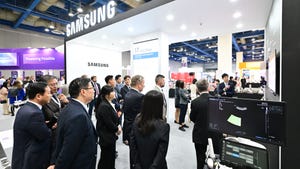Exponential-e: What Yipes Wasn't
UK Ethernet services startup hasn't raised a bean of VC money, but it's got 165 customers
February 24, 2004

A striking example of how Ethernet services are taking off in Europe exists in the U.K., in the form of a startup service provider called Exponential-e Ltd.
The awkwardly named Exponential-e has done the absolute opposite of the nicely named Yipes [ed. note: !], the Ethernet service pioneer in the U.S. that raised hundreds of millions of dollars only to go bust and get reborn as Yipes Enterprise Services Inc. (see Yipes Joins Chapter 11 Club and Yipes Reborn – Amid Accusations).
Exponential-e started small, in October 2001, and hasn’t raised a scrap of VC money. Its founders borrowed money using their homes as security to get the company started, and they’ve grown by plowing back profits.
The startup operator is already cash-flow positive, according to managing director Lee Wade. It generated revenues of £2.3 million (US$3.8 million) in its first year of service (October 2002 to September 2003).
The company has 20 on staff, most of whom came from Norwegian incumbent Telenor ASA (Nasdaq: TELN) and fellow Ethernet service provider Neosnetworks (see Neos Acquired by Power Utility). Its network has seven points of presence (POPs) in London and one in New York and has 150 enterprise and about 15 service provider customers.
Now the company is looking to ramp up its rate of growth so that it can keep pace with customer requirements. The company targeted the finance and media sectors to build its user base, and now the customers in finance want to expand their Ethernet networks beyond London to Europe's other financial centers. As a result, Exponential-e plans POPs in Paris, Amsterdam, and Frankfurt, hooked up with dark fiber, which is still very cheap and in plentiful supply, according to Wade. After that, the company wants to extend its network to other cities in the U.K.
Exponential-e plans to raise some money for this expansion, but it’s still taking a cautious approach. “We don't want to hand over control of the company to a VC just to get more money," says Wade. Offers are already on the table, he claims, and he's even had to fend off a takeover offer. But: "This company is not for sale."
Wade and his team also face some other tricky decisions, such as whether they should stick with their current equipment vendor Riverstone Networks Inc.
"Our current network is based on Riverstone 8600 switches, and I've got nothing but praise for the Riversone gear. We decided to use its gear when we first built out, because Riverstone was ahead of the field in delivering MPLS-ready equipment. And we were lucky with our timing, because we were able to pick up the equipment -- 14 switches -- from bankrupt and excess inventory stock for very low prices, about 20 cents in the dollar. That was a godsend, and saved us a lot of money."
Those bargains aren't available any more, and the rest of the vendors have caught up with Riverstone, as Wade sees it. "We could still go with Riverstone as we expand, but we're looking at others, too. Juniper Networks and Foundry Networks have some very good products, while Extreme Networks seems to have lost its way a bit."
Wade believes the greatest progress has been made by Cisco Systems Inc. (Nasdaq: CSCO). "Two years ago Cisco was way behind the pack, but it's really caught up now. But Cisco won't talk to us, because we've got a Riverstone network."
And while it's figuring out how to ramp up and achieve its target of 450 customers and revenues of £5.5 million by the end of the current year, Exponential-e is looking over its shoulder at potential rivals. Wade doesn't consider the likes of BT Group plc (NYSE: BTY; London: BTA), Colt Telecom Group plc (Nasdaq: COLT; London: CTM.L), and Fibernet Group plc (London: FIB) like-for-like competitors at the moment, but it wouldn't take much for them to be in the same game.
"We're offering Ethernet and Internet access as part of the same service, which is what makes us different from the others that just have point-to-point and point-to-multipoint connectivity services, and we're doing it at a very attractive price," says Wade (see Exponential-e Cuts Access Costs). He adds that a lot of the startups' initial success has come from winning business customers away from MCI's (Nasdaq: WCOEQ, MCWEQ) European operation. It has also helped that a direct competitor, 51°, was wound down by its new owner, French utilities giant EDF Energy, in December last year.
In an effort to keep ahead of the game, Wade and his team have recently launched a business DSL service (see Exponential-e Launches SDSL), and will shortly offer on-net VOIP for customers to make free internal voice calls across their wide-area Ethernet connections. "That's the service they're all very keen on, because the cost savings for the customers are enormous."
— Ray Le Maistre, International Editor, Boardwatch
You May Also Like










